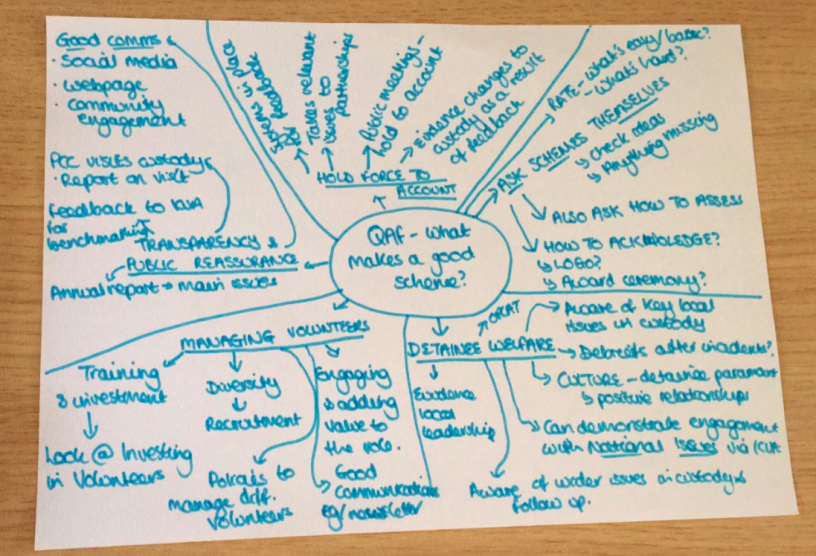
Quality Assurance – exciting term isn’t it? Made to make us think of audits, paperwork and for me possible tangents to alternative careers in biscuit factories (oh what a great job that would be…). So, when the idea of developing a Quality Assurance Framework popped up in our business plan last year with the name of yours truly next to it I unsure what the lines on the business plan would become in the fullness of time.
ICVA knows that its schemes do good work. We know that scheme managers are very seldom given full time hours to run their scheme and that the scheme manager role is often in addition to other roles. Knowing these things and asking schemes to undertake more work is always a difficult balance to strike for us, we know schemes will do their best to take part in anything ICVA asks of them, they are a great bunch, but we to ensure we don’t overwhelm them with additional work requests.
What was the purpose of this framework then I hear you ask…. Well, we hope it serves several purposes! It is a tool to help schemes to:
• Reflect on how they comply with the Code of Practice, the legislation that underpins custody visiting.
• Celebrate areas of strength.
• Promote custody visiting and the achievements they have made.
• Drive up performance of schemes.
The main thrust for Custody Visiting to exist was arising from the Scarman report post-riots in the 80s – the public needed reassurance around policing and custody visiting, (then called lay visiting), was born to assist this. Wind forward to current times, and although the reasons for ICVs are still valid, one wonders how many members of the public know they are there and what it is they do? This is something ICVA and schemes are keen to ensure grows, public reassurance is a key part of what we all do and indeed why we do it.
So, public reassurance is a driver in the framework, what else? Well, detainee welfare is at the core of what ICVs and schemes do! Ensuring that those deprived of their liberty either with or without charge are treated with dignity, and are aware of, and have access to their rights and entitlements is key. How can a QAF support this I hear you say? Well, the QAF has criteria for ensuring ICVs are aware of the relevant Human Rights legislation for detainees, that ICVs know when to escalate issues of concern (please see recent campaign on sanitary protection), and for understanding how custody visiting and detainee welfare fit in the UK NPM and the UK’s obligations under OPCAT.
Recruitment and Training and Managing volunteers are both key areas in a QAF. The effective recruitment of the right people for the role and who insofar as schemes can, reflect the community they seek to reassure, is a key area. Custody is a fast-paced and often changing environment, and we wanted to make sure that schemes and ICVs were up to date on the latest developments such as those in the mental health arena and important reports for custody such as the Angiolini Review. We have also included a range of criteria to ensure that the scheme managers are invested in and supported, this being a vital area! As mentioned above, scheme managers often have varied and multiple roles and we want PCCs and Policing Bodies to put custody visiting front and centre, supporting scheme managers in their offices to deliver an excellent standard of independent oversight for some incredibly vulnerable members of our society.
Lastly but by no means least is a range of criteria regarding holding the force to account and communications. We want schemes to be outward facing in terms of the work they do, to let the local community know that there is independent oversight for their friends, relatives and neighbours when they are taken into police custody. We want to help increase public confidence in policing where this is due by sharing evidence of good practice. Anecdotally and from my own experiences of going along on custody visits, most forces welcome the oversight and additional pressure to effect positive change in their custody suites and it’s great to have the QAF to encourage schemes and PCCs to focus on this.
How did we go about its development? Well, the development of the QAF would not have been possible without the extremely valuable input of our scheme managers, from a scheme manager assisting us with the original draft, through several waves of written and face to face consultation and for welcoming the QAF as a product. Thank you all so very much for your help to develop it. We wanted to produce something helpful to our members and that members would engage with, and thanks to you all we think we have!! Our board provided some great insight and guidance so thanks to them too for their assistance and sign off, great to have views from scheme manager directors and the PCCs on our board.
How does it work?
Schemes will assess themselves against the criteria for each level, there are 4:
• Code Complaint – Schemes meet statutory requirements and basic volunteer standards
• Silver – Schemes provide a good standard of custody visiting and volunteer management
• Gold – Schemes provide an excellent standard of custody visiting and volunteer management
• Platinum – Schemes provide an outstanding standard of custody visiting and volunteer management
Within each level, there are a set of criteria covering the areas we have talked through such as holding the force to account, and some suggested evidence schemes can use to support their assessment. For Silver and Gold claims, schemes must get their submission peer assessed and for a platinum award to be given ICVA will assess the submission.
To support schemes through their first assessments, we have developed a ‘how to’ document, a FAQs and a podcast, we have also given schemes a year-long window for their first claim and are super excited to be working with them to get their first QAF submissions up and running! We will also run masterclasses on topics to support, such as assessment tips, how to provide feedback to peers and anything else our schemes need that we can do to support!
We soft launched the QAF in April to our schemes, and there will be more communications from us to follow on this topic, keep an eye on our twitter feeds @custodyvisiting and @projectICVA and also take a peep at our shiny new website which has all the latest custody visiting news!




